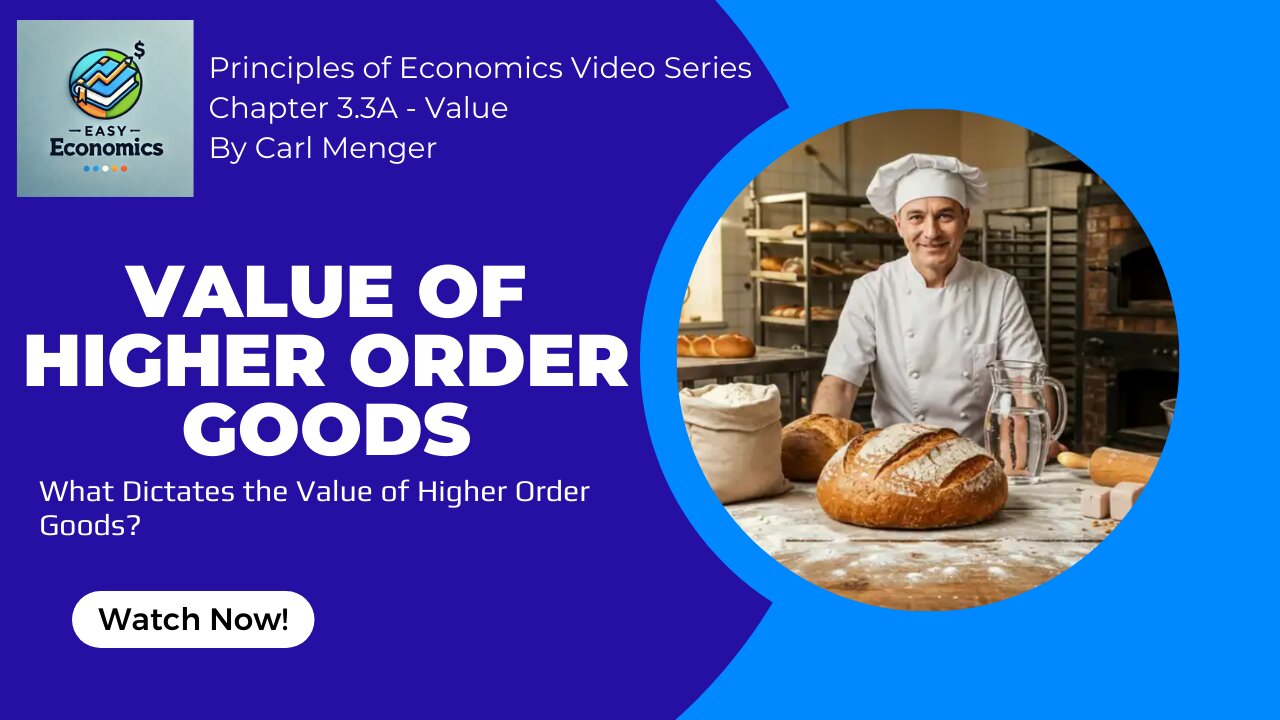Premium Only Content

Principles of Economics by Carl Menger Chapter 3.3A - What Causes the Value of Higher Order Goods?
You want to read the book? Get it here: https://amzn.to/4cCPIQs
Watch the next video in this series: https://rumble.com/v6tb0b9-principles-of-economics-by-carl-menger-chapter-3.3b-the-productivity-of-cap.html
Watch the video series from the start: https://rumble.com/playlists/I48mBTB4w2c
Watch our video about Carl Menger: https://rumble.com/v61z0l2-carl-menger-the-father-of-austrian-economics-and-subjective-value.html
Do raw materials and tools have value because they’re valuable—or because of what they can become? In this video, we unpack Carl Menger’s explanation of how the value of higher-order goods (like tools, labor, and raw materials) is determined—not by what they are, but by what they’re expected to produce.
This chapter from Principles of Economics reveals one of the most critical misunderstandings in traditional economics: the belief that products have value because of the value of the goods used to create them. Menger turns this idea on its head. He shows that value flows in the opposite direction—from consumer goods (lower-order goods) backward to the goods used to produce them.
The key insight: higher-order goods only have value because they are expected to help create valuable consumer goods in the future. If there’s no demand or expectation for the final product, the production goods lose their value—no matter how much effort or cost went into acquiring them.
We’ll explore real-world examples, like making gunpowder or producing ice out of season, to understand how future expectations shape the value of today’s production inputs.
If you’ve ever wondered how entrepreneurs decide what’s worth investing in—or why production materials can fluctuate in value even when nothing else has changed—this video explains the logic behind it. Value isn't fixed—it’s forward-looking.
❓ Questions Answered in This Video
-What are higher-order goods, and how is their value determined?
-Why can’t value come from production costs?
-How does future demand affect present value?
-Why is it wrong to think tools or raw materials have “inherent” value?
-Can production inputs have value even if the product is worthless now?
-How does Austrian Economics view the value chain in production?
-Why is value assigned backward from consumer needs?
-What role does time play in assigning value to goods?
-What happens when the expected future value of a product changes?
-How do entrepreneurs use this principle in real decisions?
00:00 - Introduction to the Laws That Govern the Value of Higher-Order Goods
00:15 - Value of Goods
00:41 - Finished Products and their Value
01:29 - Expected Value of Finished Products
01:53 - Needs in the Future
02:43 - Supply and Demand
03:34 - Outro
#ValueChain #SubjectiveValue #AustrianEconomics
-
 1:29:23
1:29:23
Glenn Greenwald
8 hours agoMarco Rubio, Europe Thwart Ukraine Peace Deal; NSA Illegally Leaks Steve Witkoff's Diplomatic Calls; Bari Weiss's Comically Out of Touch Plan for CBS | SYSTEM UPDATE #550
144K88 -
 51:15
51:15
State of the Second Podcast
9 hours agoCan You Trust Paid Gun Reviews? (ft. Tactical Advisor)
17.7K2 -
 8:56
8:56
MetatronGaming
7 hours agoSuper Nintendo NA vs PAL
28.6K8 -
 20:02
20:02
Scammer Payback
9 hours agoHijacking a Scammer Group's Live Video Calls
11.4K4 -
 3:18:30
3:18:30
Nikko Ortiz
7 hours agoArc Raiders 1st Gameplay... | Rumble LIVE
38.9K2 -
 2:17:05
2:17:05
Blabs Life
9 hours agoPART 3: Peter Jackson's King Kong: The Official Game of the Movie | Noob Plays
25.3K2 -
 18:07
18:07
MetatronCore
7 hours agoAmala Ekpunobi is BASED
24.7K7 -
 1:01:48
1:01:48
BonginoReport
8 hours agoWaddle & Gobble Receive Presidential Pardons! - Nightly Scroll w/ Hayley Caronia (Ep.185)
128K32 -
 53:41
53:41
Katie Miller Pod
6 hours agoMike & Kelly Johnson on Marriage, Family, & Demands of the Job | The Katie Miller Podcast Ep. 16
45.6K15 -
 1:31:04
1:31:04
The Daily Signal
7 hours ago $5.77 earned🚨BREAKING: Judicial CHAOS—$7 Million Somalian Fraud Scandal Thrown Out, Trans Terrorist Released
30.9K11